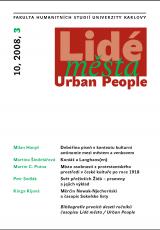Svět přeživších Židů
Prameny a jejich výklad
DOI:
https://doi.org/10.14712/12128112.3689Klíčová slova:
Jewish survivors, subjective records about the past, anthropological interpretationAbstrakt
The perspective of interpreting the past with the help of the subjective reflection of people of the past presents itself to be a possible key for understanding the given epoch, the historical processes and the background in their real form. This perspective seems to be able to answer what could be considered to be Anti-Semitism, and lends an approach to Jewish survivors after World War II generally as the impact felt by these survivors themselves. However, this anthropological perspective carries with it numerous and various tasks for the scholars involved. Firstly, the sources of information to be interpreted in this way are memories, diaries, letters or interviews, which are enormously subjective, since their authors created the very record about the past that we are interested. Moreover, these records are created under various conditions and in different time periods. Secondary influences of composing memory are so strong that there are several ways of its interpretation, not to mention the effort to use it for the actual graphical reconstruction itself. Subjective information about the past still remains to be very important, and, when isolated, could be used for the interpretation of how people of the past viewed the world around them, and especially how they reacted to the social processes in their everyday life, to the decisions they had made and also how they identified themselves with the social milieu in the long term (group identity, political orientation, values and norms preference). However, such an interpretation also carries risks. The present interpretations of the subjective reaction of Jewish survivors in the first years after the end of the War in the Czech lands are based on the chronological or thematic perspective. Such an approach proves to be problematic at least in two ways: first, the records are taken out of context and their meaning is simplified. Authors of such types of interpretations can easily forget the diverse and complicated secondary forms of subjective information, and also tend to narrate them very subjectively according to their personal point of view or to the dominant historical interpretation of the past. This article focuses on the condition of information resources that are available, and on the possibilities and the risks of their interpretation when it comes to getting to know the world of Jewish survivors in the post-war Czech lands, concretely.
Stahování
Publikováno
Jak citovat
Číslo
Sekce
Licence

Tato práce je licencována pod Mezinárodní licencí Creative Commons Attribution-NonCommercial-NoDerivatives 4.0.


